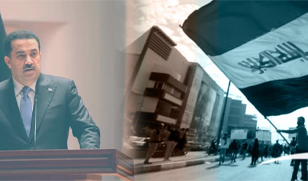 2022 / 07 / Dec
2022 / 07 / Dec
Files awaiting processing from the new Iraqi government
Ayman Al-Faisal
Researcher and interested in political affairs, Baghdad.
Iraq ended a year-long chapter of political impasse, tensions, and escalation at various levels between the various ruling political forces and parties in the country since the October 2021 elections, by voting for Mr. October 27 of this year under the leadership of Mr. Muhammad Shia’ al-Sudani, where his government obtained the confidence of parliament by an absolute majority, in a move that is considered the most important after Iraq faced a political stalemate that paralyzed the movement of official institutions in the country for a whole year, and the government of Mr. al-Sudani included 21 ministers from various components of the blocs and political parties, "while two ministries from the share of the Kurdish component are still under negotiation and have not yet been filled."
After the new government officially assumed its duties through a smooth and peaceful transfer of power, the Prime Minister, Mr. Muhammad Shia'a al-Sudani, held his first meeting with his cabinet in the government palace in Baghdad on October 28, during which he issued several directives to the ministers at the internal and external levels, which were widely welcomed by the government. The political, social and media circles, in a step considered by observers to be the first of its kind, during which Al-Sudani asked them not to make any radical and hasty changes within the ministry unless they were based on legal and objective recommendations through specialized committees that require making that change, in addition to asking him to disclose the financial disclosure of the cabinet. Within a week of assuming their ministerial portfolios, and not choosing the directors of ministers' offices on a partisan basis and making them exclusively from within the ministry.
The process of restoring political balances, adjusting the rhythm of the political process again, rebuilding the people's trust in their government, and gaining the satisfaction of the street is not an easy or easy process. A year after holding "early elections demanded by the political forces, former Prime Minister Mustafa Al-Kazemi," Iraq lived in an atmosphere of conflicts. The Ministry of Interior mostly contributed to undermining the confidence of the Iraqi citizen in the political process and in his representatives inside the parliament dome, and therefore the government of Mr. Al-Sudani is required to restore that relationship and is able to do so by providing what contributes to bridging that gap and redrawing the internal relationship in a way that allows for the production of an internal policy Balanced and durable.
As for the external level, Iraq's foreign policy is clear and based on major principles, the most important of which is; Not to interfere in the internal affairs of states, and to rely on peaceful solutions and diplomatic methods in resolving disputes between the parties to the conflict, and to distance oneself from any interventions that would involve Iraq in the policy of axes at the international level, as the Prime Minister, Mr. Muhammad Shayaa al-Sudani, seeks through his government to confirm Iraq's keenness Strengthening its international and regional relations in accordance with common interests and on the basis of mutual respect and in a manner that serves the common interests of Iraq and those countries, and as a continuation of what Iraq began to do in restoring its role in the international and regional arena, specifically after the year 2014 of its war on terrorism, fulfilling its international obligations and adopting a policy of neutrality in most of its UN resolutions in International organizations, the new government has files that are required to be dealt with through agreements and creating understandings or mobilizing international support to obtain support in winning them, and perhaps the most prominent of these challenges are:
First: energy and the oil market
Iraq depends mainly on oil for its revenues, and this makes it vulnerable to risks in light of fluctuations in oil prices as a result of global political and economic conditions, and that any decrease in global oil prices will negatively affect the state’s annual budget, “and after the decisions of the OPEC Plus group on the 8th of this month, which will extend Until the end of 2023," the government will have to deal with the new policy with caution, because the OPEC Plus decision is tantamount to announcing the emergence of a multipolar world system, and accordingly, Iraq's position in light of the reversal of the global political situation since the outbreak of the Russian war on Ukraine and the use of the oil and gas card from before Moscow in managing its conflict with America and Europe; It must be considered in a manner that does not bear harm, since the Iraqi budget that will be prepared by the government of Mr. Al-Sudani for the year 2023 must be based on a specific price per barrel, and that any change in oil prices must have prior understandings with the exporting countries in OPEC to reduce expected losses on Iraqi economy.
Second: the continuation of dialogue at the regional level
The Iraqi government conducted several rounds of regional dialogues in 2021, which concluded a state of understandings that reflected positively on the Iraqi role in the region between Saudi Arabia and Iran and between Egypt and the Emirates The Iraqi affirmatively, today and after receiving the Prime Minister Muhammad Shia Al-Sudani believes that there are fears that Iraq will not continue with this role, and in fact, Mr. Al-Sudani is able and strongly to continue this role and push it forward because of the political tools, work mechanisms and political experience he possesses sufficient to play this role.
Third: Iraq's commitments and climate change
Iraq and its large oil storage and production, this does not mean that it will be outside the obligations and international agreements related to the climate and not harming the environment. Iraq is facing the challenge of climate change and it must work to mitigate its effects through managing natural resources, developing renewable resources and increasing flexibility in facing the resulting risks. On the climate and achieving a systemic change within the government in order to achieve climate aspirations towards the Paris Climate Agreement, "Also, Iraq presented the 2021 document that is considered the country's supreme policy for climate action, which begins by encouraging the use of renewable energies, promoting nature-based solutions and strengthening integrated management water resources, and reducing greenhouse gas emissions from the oil and gas sector,” especially since Iraq suffers from a high percentage of drought in the Tigris and Euphrates rivers as a result of climate changes on the one hand, and as a result of reducing its water share from neighboring Turkey on the other hand.
Fourth: Protecting the diplomatic missions and military trainers of the international coalition
Iraq has always affirmed its commitment to protecting the diplomatic missions operating on its territory, and that any action considered destabilizing to the security and stability of Iraq and the diplomatic missions present on its territory will put the government to the test with regard to holding those responsible accountable, as it must be committed to providing security and protection for diplomatic missions and adopting all guarantees to facilitate their work In accordance with what was stipulated in international agreements, in addition to ensuring the functioning of the advisors of the international coalition and their equipment, after they were subjected to almost daily attacks in the past year, as the government must act in accordance with the common interests between Iraq and the countries of the world, as well as in accordance with the laws and regulations that govern the nature of that relationship.

Ayman Al-Faisal